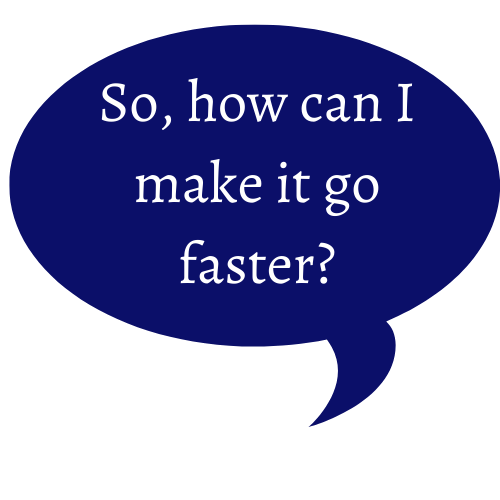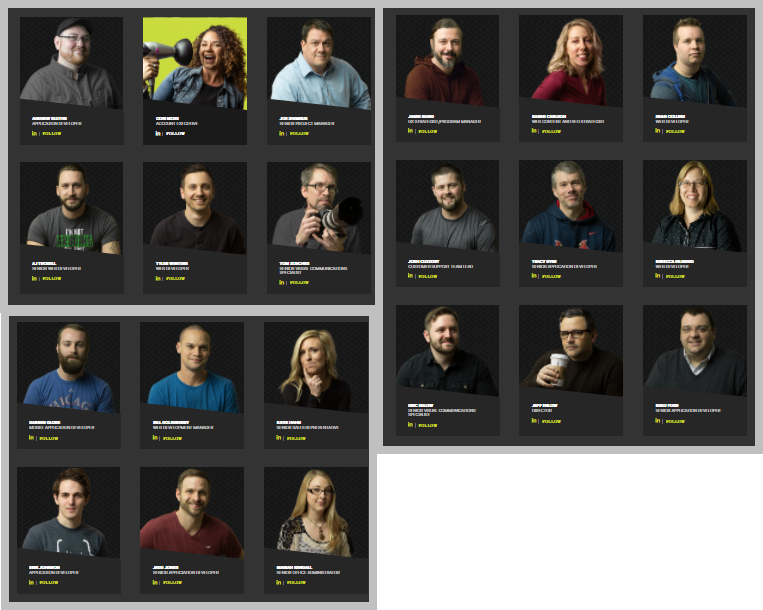
“So, how long will this take anyway?”
“When will my website launch if I sign today?”
“What is the timeframe?”
These are all questions that new customers ask when we’re working through a proposal, or even moving through the early stages of the development process.
Even in the absence of a hard deadline (such as a scheduled marketing initiative, a major conference, or a mandated delivery date set by investors or a board of directors), a customer will still want to know how long it will take us to complete their website. Well, we’re about to let you in on a little industry secret.
Are you ready?
It kinda’ depends.
OK, we kid ... but there is some truth to that very simple statement.
There are a LOT of moving parts to a large website build and each can factor into the final timeline.

So how can I make it go faster?
What you might not know is you, the customer, can have a huge impact on the length of time it takes someone to build your site. You see, a website isn't something that you just hire someone to build and then they go away and make it happen.
Like the construction of your brick and mortar location, or even your own home, the building of a website requires a close working relationship between the customer and the builder.
As we always tell our clients ... we know web development, you know your audience ... let’s work together to build something great. And when we say great, we mean a great representation of your brand, a great user experience for your customers and prospects, and a great tool for growing your business!
1. Start With a Plan ... and an Outline!
Remember “The Holt Handbook”? It was a great college textbook about grammar and mechanics, especially for those of us who actually didn’t mind writing term papers. And, unlike that ill-advised Latin class I took freshman year, it actually taught me a few lessons that I still use today. Lessons like how to collect and organize information and create the structure of a story.
You don’t need “Web Content for Dummies” to write effective content, you just need to remember the time-tested lessons from your best English teacher. But keep in mind ... you don’t get extra points for padding web content! Keep it short and simple. Respecting the viewer’s time is always a winning strategy for effective communication.
Need help with your strategy? Contact me to get your free Website Strategy Discovery document to help you start planning your next website. Ask for "The Enlow Handbook."
2. Don’t go it alone
Be sure to designate someone (or a small team of people) within your organization to act as the primary stakeholder(s). And if you’re a small business owner, then that someone might have to be you. Whoever it is, just remember to make sure that the designated stakeholder has the power, authority, and time to devote to the project.
We at LRS have seen plenty of website projects go off the rails when our customer’s daily workload didn’t allow them time to devote to the site.
Even worse is when someone is designated as the stakeholder but still has to run every decision up the chain. That can really compound the delays because some decision-makers never seem to have time to you know ... make decisions.
Empower these people! If they need dozens of PDF forms from multiple department heads to place on the site's "Downloads" page, then make sure those department heads know that their cooperation is required.
A stakeholder who has to spend all their time corralling coworkers to provide content is going to burn out quickly. Help them out by holding employees (and yourself if you’re the business owner) to account for getting stakeholders what they need.
And always remember, we’re here to help! See below!*
3. Make Friends With Your Content
No one wants to talk about website content as a project begins. Heck, no one really even wants to think about it.
As a result, we often find that customers don't really know what they're getting into as the build begins. Have you ever talked to someone who just worked with a general contractor to build their first house?
Even if they worked with a great builder, they’re likely to tell you that they were overwhelmed with the number of decisions they had to make. But, just like that dream entryway, you want the look and the feel of your homepage to make a great first impression, and builders like us need your help to make that happen.
Read why your company's website is more important than your brick and mortar location.
When it comes to writing the content, you and your designated stakeholder should keep in mind that less really is more. You don’t have to write a thousand-word essay for every service you offer, and no one needs a hundred bullet points for every product you sell. Keep it simple ... and think mobile first! If it’s the amount of information you’d be comfortable reading on your phone, then it’s the right amount for your desktop computer as well. Content is king but, for the poor staff member in your office who’s tasked with writing it, there are plenty of other four-letter words that can apply as well.
4. Overwhelmed? Get Help from Professionals
All of that might start you thinking -- “So, wait ... I provide the photos, the product descriptions, the staff bios, the company history, the company news, items for the calendar of events, schedule staffers to write blog posts, and ... and ... and?”.
That’s where the hyperventilating might start, but relax! We’ve been through this before and can give you all the guidance you’ll need.
Sure, a lot of content is required to build a really useful site, and yes, you’re responsible for providing it, but the experience doesn’t have to be overwhelming. Consider it to be like “your homework” on this fun group project.
5. Don’t Get Discouraged
Every customer has high hopes at the beginning of a website project. Then reality sets in ...
“No one’s emailing me back with approval to use their survey comments as testimonials!”
“Organizing this big group photo of the staff has been like herding cats!”
“Legal says the wording on my calls to action will get us sued!!!”
If those don’t sound familiar, then consider yourself lucky. But also remember that overseeing a web site build from the customer side doesn’t have to be a nightmare. Again ... there’s help when you need it. *
6. Stick to the Schedule
Be sure that your website design firm uses a project manager to keep the project on track. Chances are, you and your team will have responsibilities and to-do tasks. Be sure to hit those deadlines so the project can stay on schedule.
7. Communicate with the Website Project Manager
We understand that you have waaay more on your to-do list than redesigning your website. It’s easy to ignore the emails from your web developer. In a word, please don’t. (OK, that’s two words). A good web company will try to make it as easy on you as possible. We can all get through this together if we talk to each other.
How Much Time Will I Save?

We compared a few projects similar in scope and estimated hours. The big difference was that they had two different kinds of stakeholders: those who were attentive and helpful, and those who tended to tuck the website redesign at the bottom of their to-do list.
Based on this comparison and our years of experience, a responsive and motivated stakeholder can decrease the amount of time required for a website build by anywhere from 35% to 75%.
Again, it depends. But following these guidelines can make your website go faster, be more efficient, and a more enjoyable project.
A responsive and motivated stakeholder can decrease the amount of time required for a website build by anywhere from 35% to 75%.
Finis!
(Maybe that Latin class was useful after all.)

There's obviously a lot to consider when you take on a website for your business, even when you hire someone to do it. Be realistic about your goals, set priorities, and remember that experienced companies like LRS can show you the ropes. We’ll be honest about what you're getting yourself into, but we’ll also make the experience a lot less painful.
*With decades of web development experience working with hundreds of customers, our team of graphic designers, front-end developers, application developers, a UI-UX specialist, a web content & SEO strategist, an in-house photographer & videographer are all here to help! (See the intrepid team.)
LRS Web Solutions was built to make the process of putting your business online as seamless as possible. Let us help!